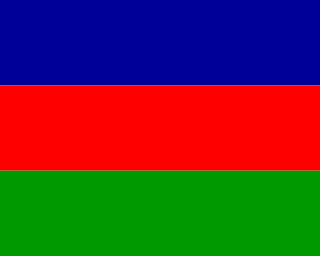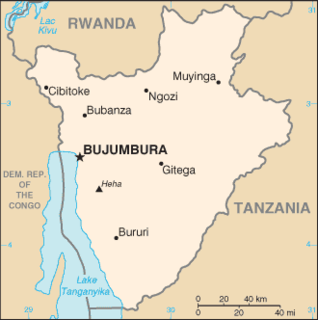
Politics of Burundi takes place in a framework of a transitional presidential representative democratic republic, whereby the President of Burundi is both head of state and head of government, and of a multi-party system. Executive power is exercised by the government. Legislative power is vested in both the government and the two chambers of parliament, the Senate and the National Assembly.
The BurundiNational Defence Force is the state military organisation responsible for the defence of Burundi.

Burundi originated in the 16th century as a small kingdom in the African Great Lakes region. After European contact, it was united with the Kingdom of Rwanda, becoming the colony of Ruanda-Urundi - first colonised by Germany and then by Belgium. The colony gained independence in 1962, and split once again into Rwanda and Burundi. It is one of the few countries in Africa to be a direct territorial continuation of a pre-colonial era African state.

The Democratic National Rally is a political party in Algeria. It is led by Ahmed Ouyahia. The party held its Second Congress on 15–17 May 2003.
The Islamic Renaissance Movement is a moderate Islamist political party of Algeria.

Gitega, formerly Kitega, is the capital of Burundi. Located in the centre of the country, in the Burundian central plateau roughly 62 kilometres (39 mi) east of Bujumbura, Gitega was the seat of the Kingdom of Burundi until its abolition in 1966. In late December 2018, Burundian president Pierre Nkurunziza announced that he would follow on a 2007 promise to return Gitega its former political capital status, with Bujumbura remaining as economic capital and centre of commerce. A vote in the Parliament of Burundi made the change official on 16 January 2019, with all branches of government expected to move in over three years.

The National Unity Party is a political party in the Central African Republic.
François Ngeze is a Burundian retired politician. He served as the acting head of state of Burundi from 21 October 1993 to 27 October 1993. He was chosen by the military Committee of Public Salvation, a group of army officers that staged the 1993 Burundian coup d'état attempt overthrew the democratically elected government of president Melchior Ndadaye.

The Party for National Recovery is a minor political party in Burundi. It was founded in May 1994 by the former president Jean-Baptiste Bagaza. Bagaza, an ethnic Tutsi, had established a military dictatorship in Burundi from 1976 until his deposition in 1987, after which he lived in exile. He was allowed to return to the country during its democratization under Pierre Buyoya after 1992.

The National Council for the Defense of Democracy is a political party in Burundi.

The Democratic Forum for Modernity is a political party in the Central African Republic.

Burundi, officially the Republic of Burundi, is a landlocked country in the Great Rift Valley where the African Great Lakes region and East Africa converge. It is bordered by Rwanda to the north, Tanzania to the east and southeast, and the Democratic Republic of the Congo to the west; Lake Tanganyika lies along its southwestern border. The capital cities are Gitega and Bujumbura, the latter of which is also the largest city.

Parliamentary elections were held in Burundi on 23 July 2010. The opposition parties boycotted the election after also boycotting the presidential election.

The 1987 Burundian coup d'état was a bloodless military coup that took place in Burundi on 3 September 1987. Tutsi president Jean-Baptiste Bagaza was deposed whilst traveling abroad and succeeded by Tutsi Major Pierre Buyoya.
The Broad Convergence for the Salvation of Angola – Electoral Coalition is a political alliance in Angola. Members include the Angolan Free Alliance Majority Party, the Angolan Pacific Party, the Democratic Bloc, the Party for Democracy and Development in Angola-Patriotic Alliance and the National Salvation Party of Angola.

Parliamentary elections were held in Burundi on 29 June 2015. The vote had been initially set for 5 June 2015, alongside local elections, but it was delayed due to unrest. Indirect elections to the Senate occurred on 24 July.
The United Patriots was a nationalist electoral alliance in Bulgaria formed by three political parties: IMRO – Bulgarian National Movement (IMRO), Attack, and the National Front for the Salvation of Bulgaria (NFSB).

Good is a South African political party that was formed in December 2018. It is led by its founder Patricia de Lille, current Minister of Public Works and Infrastructure and former Mayor of Cape Town. The party's policies are predominantly left-wing and its platform is premised on social democracy, environmentalism, anti-racism and Broad-Based Black Economic Empowerment. The party's stronghold is the Western Cape and mainly draws support from the Coloured community.

General elections were held in Burundi on 20 May 2020 to elect both the president and the National Assembly. Évariste Ndayishimiye of the ruling CNDD–FDD was elected president with 71% of the vote. In the National Assembly elections, the CNDD–FDD won 72 of the 100 elected seats.









